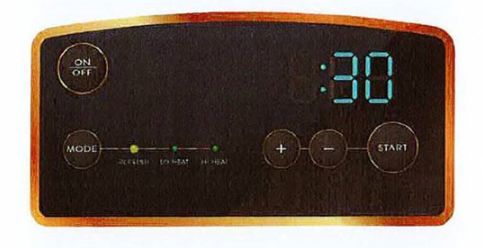Despite the existence of a copyright registration, the SDNY recently dismissed a copyright infringement claim for the control panel of a portable clothes dryer system, finding that the registered design covered a non-copyrightable utilitarian article.
Plaintiff Town & Country Linen Corp. and Defendant Ingenious Designs LLC entered a three-year Mutual Non-Disclosure Agreement ("MNDA"), under which Town & Country designed and developed various concepts and products for Ingenious with the intention to negotiate future agreements to market the products. Under the MNDA, Town & Country redesigned a portable clothes dryer system previously sold by Ingenious ("CloseDrier") and devised several concepts for Aramid fiber luggage products ("Project"). Town & Country invested heavily in the CloseDrier and the Project, and secured a design patent covering the CloseDrier, as well as a copyright registration covering the CloseDrier" Control Panel Design ("Design") (shown below):

Town & Country's complaint alleged that Ingenious used Town & Country's intellectual property and confidential information without Town & Country's authorization after negotiations failed to culminate in agreements with Ingenious to market the products. Ingenious moved to dismiss Town & Country's claims for copyright infringement, patent infringement, misappropriation of ideas, quantum meruit, unjust enrichment, and unfair competition.
In dismissing Town & Country's copyright infringement claim for Ingenious' use of the Design, the court found that the Design was a non-copyrightable utilitarian article, notwithstanding the presumption of copyrightability that arose from Town & Country's copyright registration. The Court noted that, while a U.S. Copyright Registration creates a rebuttable presumption of copyrightability, evidence that the work is a non-copyrightable utilitarian article can overcome this presumption.
In assessing Town & Country's copyright registration covering the Design, the Court focused on the standard for copyright protection of utilitarian articles adopted by the Supreme Court in Star Athletica, L.L.C. v. Varsity Brands, Inc., 137 S. Ct. 1002, 1008 (2017). In Star Athletica, the Supreme Court found that "the design of a useful article is considered a pictorial, graphical or sculptural work [subject to copyright protection] only if, and only to the extent that, such design incorporates pictorial, graphic, or sculptural features that can be identified separately from, and are capable of existing independently of, utilitarian aspects of the article." Id. at 1010.
While the Court found the Design passed the separability test (because it consisted of separately identifiable features), the Court held the Design was a utilitarian aspect of the CloseDrier and could not exist independently from it. The Court reasoned that the Design "is not capable of existing independently of the utilitarian aspects of the CloseDrier because the control panel itself is a utilitarian aspect of the CloseDrier." The Court also likened the Design to other utilitarian designs adjudged non-copyrightable, e.g. computer program menu command screens in Jamison Bus. Sys., Inc. v. Unique Software Support Co., No. 02 Civ. 4887, 2005 WL 1262095, at *12 (E.D.N.Y. May 26, 2005) and the VCR button arrangement in Lotus Dev. Corp. v. Borland Int'l, Inc., 49 F.3d 807, 817 (1st Cir. 1995), aff'd, 516 U.S. 233. And while those decisions predated Star Athletica, they covered subject matter that the Court seemed to view as analogous to the Design at issue.
The Court dismissed Town & Country's claim for misappropriation of ideas related to the Project for lack of novelty (as evidenced by several patents predating Town & Country's work product) and dismissed its claim related to the CloseDrier as preempted by federal patent law.
With respect to the other claims at issue, the Court denied Ingenious' motion to dismiss Town & Country's patent infringement, quantum meruit, and unjust enrichment claims. The Court also retained Town & Country's unfair competition claim against the individual defendant, finding Town & Country had adequately alleged the individual defendant's misappropriation of Town & Country's "labors and expenditures" with "some element of bad faith."
The case is Town & Country Linen Corp., et al. v. Ingenious Designs LLC et al., 18 Civ. 5075, 2020 U.S.P.Q.2d 31604 (S.D.N.Y. 2020).
The content of this article is intended to provide a general guide to the subject matter. Specialist advice should be sought about your specific circumstances.

